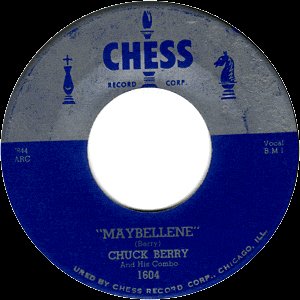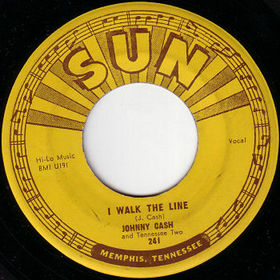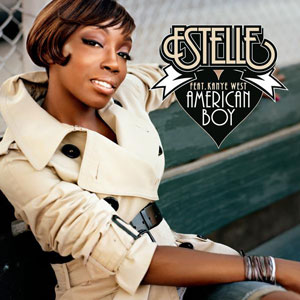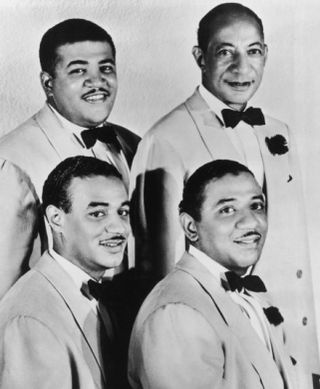
"Johnny B. Goode" is a song by American musician Chuck Berry, written and sung by Berry in 1958. Released as a single in 1958, it peaked at number two on the Hot R&B Sides chart and number eight on its pre-Billboard Hot 100 chart. The song remains a staple of rock n' roll music.

"Folsom Prison Blues" is a song by American singer-songwriter Johnny Cash, based on material composed by Gordon Jenkins. Written in 1953, it was first recorded and released as a single in 1955, and later included on his debut studio album Johnny Cash with His Hot and Blue Guitar! (1957), as the album's eleventh track. The song combines elements from two popular folk styles, the train song and the prison song, both of which Cash continued to use for the rest of his career. It was one of Cash's signature songs. Additionally, this recording was included on the compilation album All Aboard the Blue Train (1962). In June 2014, Rolling Stone ranked it No. 51 on its list of the 100 greatest country songs of all time.

"Misty" is a jazz standard written and originally recorded in 1954 by pianist Erroll Garner. He composed it as an instrumental in the traditional 32-bar format, and recorded it on July 27, 1954 for the album Contrasts. Lyrics were added later by Johnny Burke. It appeared on Johnny Mathis' 1959 album Heavenly, and this recording reached number 12 on the U.S. Pop Singles chart later that year. It has since become Mathis’ signature song.

"Flowers on the Wall" is a song originally recorded by American country music group The Statler Brothers. Written and composed by Lew DeWitt, the group's original tenor vocalist, the song peaked in popularity in January 1966, spending four weeks at number two on the Billboard magazine Hot Country Singles chart, and reaching number four on the Billboard Hot 100 chart.
"You Always Hurt the One You Love" is a pop standard with lyrics by Allan Roberts and music by Doris Fisher. First recorded by the Mills Brothers, whose recording reached the top of the Billboard charts in 1944, it was also a hit for Sammy Kaye in 1945.

"That Old Black Magic" is a 1942 popular song written by Harold Arlen (music), with the lyrics by Johnny Mercer. They wrote it for the 1942 film Star Spangled Rhythm, when it was first sung by Johnny Johnston and danced by Vera Zorina. The song was nominated for the Academy Award for Best Original Song in 1943 but lost out to "You'll Never Know".

"Maybellene" is a rock and roll song by American artist Chuck Berry, adapted in part from the western swing fiddle tune "Ida Red". Released in 1955, Berry’s song tells the story of a hot rod race and a broken romance, the lyrics describing a man driving a V8 Ford and chasing his unfaithful girlfriend in her Cadillac Coupe DeVille. It was released in July 1955 as a single by Chess Records, of Chicago, Illinois. Berry's first hit, "Maybellene" is considered a pioneering rock and roll song. Rolling Stone magazine wrote of it, "Rock & roll guitar starts here." The record was an early instance of the complete rock and roll package: youthful subject matter; a small, guitar-driven combo; clear diction; and an atmosphere of unrelenting excitement.

"I Walk the Line" is a song written and recorded in 1956 by Johnny Cash. After three attempts with moderate chart ratings, it became Cash's first #1 hit on the Billboard country chart, eventually reaching #17 on the Billboard Hot 100.

"The Battle of New Orleans" is a song written by Jimmy Driftwood in 1936. The song describes the Battle of New Orleans from the perspective of an American soldier; it tells the tale of the battle with a light tone and provides a rather comical version of what actually happened at the battle. It has been recorded by many artists, but the singer most often associated with this song is Johnny Horton. His version, recorded at Bradley Studios in Nashville, Tennessee, scored number 1 on the Billboard Hot 100 in 1959. Billboard ranked it as the No. 1 song for 1959, it was very popular with teenagers in the late 1950s/early 1960s in an era mostly dominated by rock and roll music.
"If I Were a Carpenter" is a folk song written by Tim Hardin in the 1960s, and re-recorded with commercial success by various artists including Bobby Darin, The Four Tops and Johnny Cash. Hardin's own recording of the piece appeared on his 1967 album Tim Hardin 2. It was one of two songs from that release performed by Hardin at Woodstock in 1969. The song, believed by some to be about male romantic insecurity, is rumored to have been inspired by his love for actress Susan Morss, as well as the construction of Hardin's recording studio.

"Wake Up Little Susie" is a popular song written by Felice and Boudleaux Bryant and published in 1957.

"Under the Boardwalk" is a pop song written by Kenny Young and Arthur Resnick and recorded by The Drifters in 1964. It charted at number four on the Billboard Hot 100 chart on August 22, 1964. The song has since been covered by many other artists, with versions by Bette Midler, Sam & Dave, Tom Tom Club, The Rolling Stones, Billy Joe Royal, The Beach Boys, Bruce Willis, Bad Boys Blue, John Mellencamp and Lynn Anderson all charting in the United States or overseas. The song ranked number 487 on Rolling Stone's list of The 500 Greatest Songs of All Time in 2004 and number 489 in 2010.

"Ain't Misbehavin'" is a 1929 stride jazz/early swing song. Andy Razaf wrote the lyrics to a score by Thomas "Fats" Waller and Harry Brooks for the Broadway musical comedy play Connie's Hot Chocolates. It was published by Mills Music.
"Candy" is a popular song. The music was written by Alex Kramer, the lyrics by Mack David and Joan Whitney. It was published in 1944.

"Turn On Your Love Light" is a rhythm and blues song recorded by Bobby Bland in 1961. It was an important R&B and pop chart hit for Bland and has become one of his most identifiable songs. A variety of artists have recorded it, including Them and the Grateful Dead, who made it part of their concert repertoire.

"American Boy” is a song by British singer and rapper Estelle featuring American rapper Kanye West from the former's second studio album Shine (2008). The song was written by the artists, alongside Ethan Hendrickson, will.i.am, John Legend, Josh Lopez, Caleb Speir, and Keith Harris. It was produced by will.i.am, and uses the instrumental from "Impatient" from his own third studio album Songs About Girls (2007). "American Boy" is a breezy R&B and disco-funk song that lyrically describes a romance with an American suitor. The song's conception came after Legend, Estelle's mentor, suggested she write a song about meeting a man from the United States.
"Funny How Time Slips Away" is a song written by Willie Nelson and first recorded by country singer Billy Walker. Walker's version was issued as a single by Columbia Records in June 1961 and peaked at number 23 on the Hot C&W Sides chart before being included on his 1963 Greatest Hits album. The song has been featured in several live action films and television shows, such as in "Switch", the first episode of the second season of AMC’s series Better Call Saul in 2016 and in the 2020 Netflix drama film The Devil All the Time.

"Daddy Sang Bass" is a song written by Carl Perkins, with lines from the chorus of "Will the Circle Be Unbroken?" and recorded by American country music singer Johnny Cash. It was released in November 1968 as the first single from the album The Holy Land. The song was Cash's sixty-first release on the country chart, going on to No. 1 on the Billboard country chart for 6 weeks and spending a total of 19 weeks there. The single reached No. 56 on the Cashbox pop singles chart in 1969. "Daddy Sang Bass" was also released on the Columbia Records Hall of Fame Series as a 45, #13-33153, b/w "Folsom Prison Blues". The record was nominated in the CMA awards category of Single of the Year by the Country Music Association (CMA) in 1969.

The Mills Brothers, sometimes billed The Four Mills Brothers and originally known as Four Boys and a Guitar, were an American jazz and traditional pop vocal quartet who made more than 2,000 recordings that sold more than 50 million copies and garnered at least three dozen gold records.

Song Sung Blue is an album by American pop singer Johnny Mathis that was released on September 13, 1972, by Columbia Records and featured his renditions of mostly recent chart hits.
















